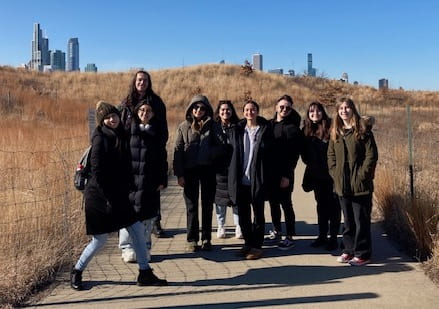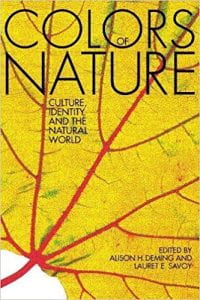Hey there, RU students! Looking for an Ideas of Social Justice course to take this summer to make progress on your CORE gen ed requirements? Here’s a great option: a 5-week fully online seminar, SUST 101 Humans & Nature, taught by Prof. Mike Bryson of the Sustainability Studies Program at Roosevelt from 5/30 to 7/10.

To register for this class: please visit RU’s Registration page for info and contact your academic advisor for your summer (and fall!) registration code(s). You can find the name of your advisor in Degree Works.
SUST 101 (CRN 31950) features interactive online discussions on Bb and three self-directed “nature outings,” wherever you are, that give you a great excuse to get outside and enjoy summertime while earning credit for this unique learning experience. For more information on that, just email Prof B (mbryson@roosevelt.edu).
Detailed info for those who want to learn more:
This summer 2023 section of SUST 101 Humans & Nature takes place fully online on a compressed five-week calendar from 5/30 to 7/10. We’ll be using the virtual learning environment of Blackboard (hereafter referred to as “Bb,” for short). The key thing to understand about online courses, like this one, is that they’re interactive — just as my on-campus students read assignments, write papers, construct arguments, do research, and come to class to engage in lively discussion, so too will you share ideas and interact in virtual time. Bb gives us the web-based tools to do just that.
For the vast majority of our interaction, we’ll use threaded discussion forums, which are asynchronous (i.e., not in real time) means of communicating, to exchange ideas and materials on a weekly basis. Reading and posting to the discussion board is like coming to class, except that you can do it any time of day throughout a given week.
Learning Objectives
Students who complete SUST 101 successfully should be able to:
- Understand how different individuals, whether political theorists, philosophers, artists, activists, scientists, and/or writers, have characterized the relationship between themselves and nature (and, more broadly, between the human species and the non-human environment)
- Appreciate the complexity of the physical and biological world, and understand the various impacts humans have upon local and global ecosystems
- Draw connections between their own life experiences as they evaluate and expand upon their understandings of the texts of this course
- Articulate ways in which the course themes embody or illuminate ideas of social and environmental justice
- Demonstrate skills in foundational academic skills: close analysis of texts, idea-centered dialogue, and essay writing
- Become a better communicator by honing one’s writing and discussion skills, using words powerfully and strategically, and gaining confidence in the mastery of these skills
SUST Program Learning Objectives addressed in SUST 101:
- Understand the relationships among social justice, environmental justice, and corporate social responsibility; and analyze sustainability issues in light of this ethical framework.
- Apply knowledge about sustainability to areas of personal, educational, and/or professional interest through applied research, community service, environmental activism, project management, or related activities.
Required Textbook
 The selections in our textbook comprise the bulk of our assigned readings for this semester. It is available in print from the RU bookstore as well as a free e-book from the RU library. Make a note of the ISBN # so you get the correct edition when ordering. Additional reading selections will be available to you on our course Blackboard (Bb) site.
The selections in our textbook comprise the bulk of our assigned readings for this semester. It is available in print from the RU bookstore as well as a free e-book from the RU library. Make a note of the ISBN # so you get the correct edition when ordering. Additional reading selections will be available to you on our course Blackboard (Bb) site.
Deming, Alison, and Lauret Savoy, eds. The Colors of Nature: Culture, Identity, and the Natural World. 2011. Milkweed Editions. Paper. ISBN 9781571313195.
Requirements and Key Assignments
This class is five weeks in duration (running from 6/1 through 7/5) and has a distinct weekly rhythm. Required readings will include selections from our assigned textbook, supplemented by assorted websites related to each week’s topic, student-selected readings and videos, and/or other documents (usually pdfs) available in the Readings section of our Bb site. Key course requirements include:
- Class Participation: regular and engaged participation during our weekly online discussions of assigned readings
- Discussion Leadership: an assigned week during which you select and lead discussion on one selection from our anthology (this is on top of your regular class participation for that week)
- Nature Outings: three self-directed nature excursions (30 minutes or more) in which you observe and experience nature in whatever context is appealing and available to you, then post your reflections about it on the DB
- Creative Nature Essay: a 4-5 page paper that creatively engages and explores your relationship with the natural world, as well as critically reflects upon two of our course readings